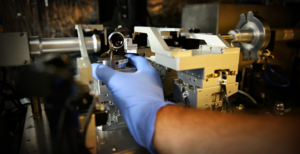
Stakeholder Spotlight – CEREGE
Tell us a little about your organisation. How do the areas of nanotechnology and sustainability impact your work?
The CEREGE is a large geosciences laboratory that gets most of its core funding from the CNRS, the main public research organisation in France, and Aix Marseille University. The “nano group” of the CEREGE has been active for the past two decades to examine not only the environmental risks of nanotechnologies but also the entire life cycle of a nano-enabled product in a safe(r) by design perspective. This research comes with tough detection and characterisation challenges, especially during the service life and end-of-life of nanomaterials. We are fortunate to have on-site a wide selection of instrumentation and, in particular state-of-the-art X-ray based imaging tools. These instruments are of course available to our colleagues in academia, but we do also offer access to the private industry to cover specific characterisation needs.

What is the newest/most innovative development in nanotechnology that you and/or your organisation is excited about now?
This is a tough question. It is tempting to say “all of it”; there are so many new applications and products making use of nanotechnology, and quite naturally, advances in addressing the COVID-19 pandemic are currently in the spotlight. At the CEREGE, our research efforts in the coming years will explore another exciting field: the design of a new generation of nano-based agrochemicals, which will reduce the burden on soil and water resources. This is by essence an interdisciplinary project. Synthesising improved agrochemicals based on a highly targeted delivery to limit the quantity of the substances used is a big focus. Their environmental safety is another major issue since the nanomaterial and/or its degradation by-products are released directly into the environment during or immediately after the service life, similarly to some soil clean-up solutions or certain categories of cosmetics. Our mesocosm set-up will be of great help in monitoring the effects of these new nanomaterials in a miniature ecosystem.

What, in your opinion, is the most important thing (tool, process, support, etc.) that is needed right now to help grow and strengthen the nanotechnology community?
One word comes to mind: Stability. The tremendous turmoil caused by the pandemic has had a large impact on all activity sectors. Businesses now need to recover and re-gain confidence in what the market will be in the coming years. This is of course beyond our control, but we all hope that we are moving towards a post-COVID world.
Regarding nanotechnology specifically, stability is also needed on a regulatory level. Existing regulations are rather difficult to follow, for instance in the EU where requirements and definitions for REACH, for specific activity sectors (biocides, cosmetics…), or for registration in certain member states do not necessarily match. There is a definite need to move towards an easier navigate the regulatory environment. Ideally, this should be a global process. We support these efforts by adding our scientific/technical expertise to European projects and international initiatives. In this context, our activities also include developing databases using published results and dedicated to environmental impacts to help inform the decision making and regulation processes.
What, in your opinion, are important factors or influences that will affect the direction of the nanotechnology community in the future?
The best nano-science and the most elaborate nano-enabled products become meaningless if nobody wants them. Therefore general acceptance is a key issue. This is a complicated task since, depending on geographical area and cultural background, the acceptance level goes from enthusiasm to mistrust. There is no “one size fits all” communication strategy. We need to learn from past mistakes in handling sensitive issues. The communication mishaps during the current Covid crisis are just a recent example. “Educating the public”, an expression we are not fond of, has the disagreeable undertone of the “knowledgeable few” teaching lessons. Instead, we believe that our outreach efforts need to consist in providing scientific sound facts as part of a larger, sometimes partisan, panel of information sources that people use to build their opinion. Of course, this needs to be a part of an open and positive dialogue between all stakeholders, which we want and need to participate in.
Interviewee person: Armand Masion (Senior Research Scientist, CEREGE, France). For more information in CEREGE, visit their website: CEREGE.fr | Centre Européen de Recherche et d’Enseignement des Géosciences de l’Environnement

